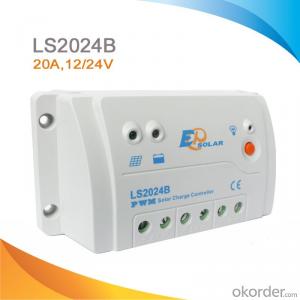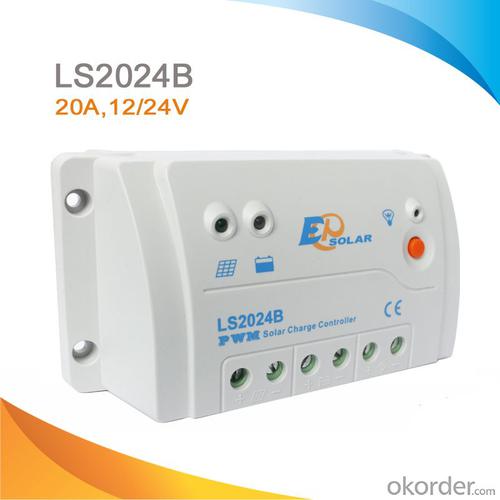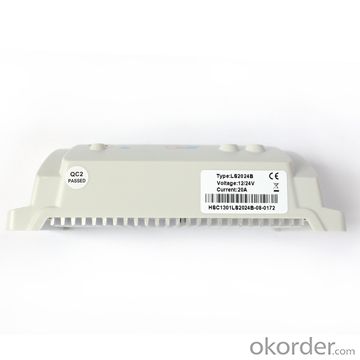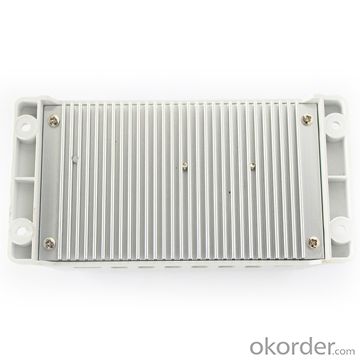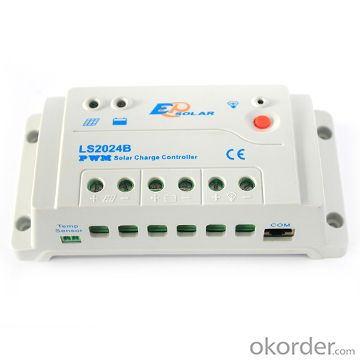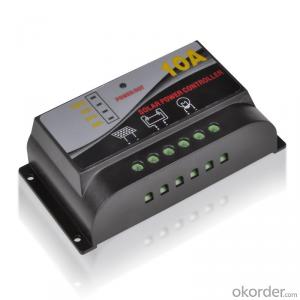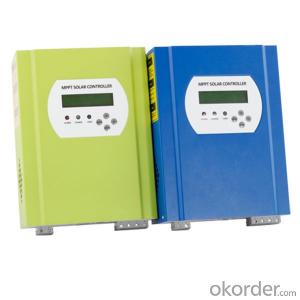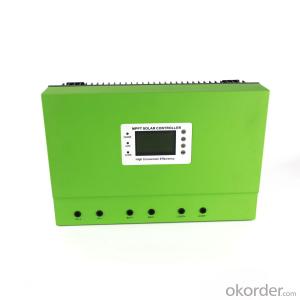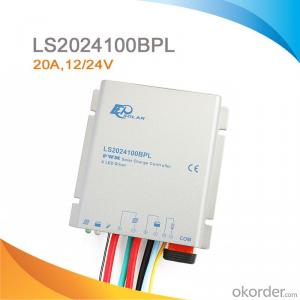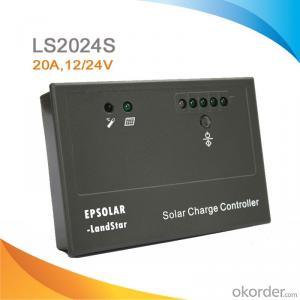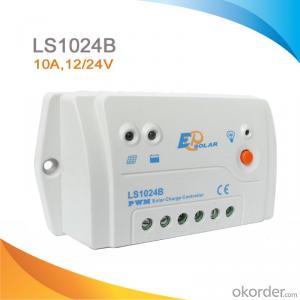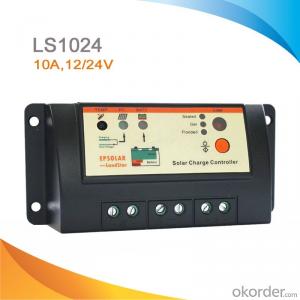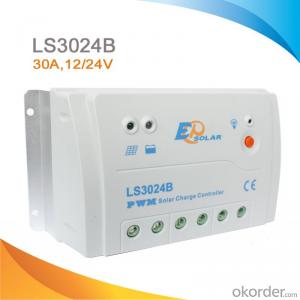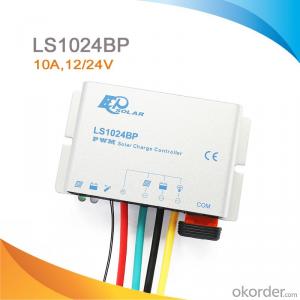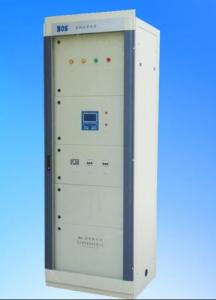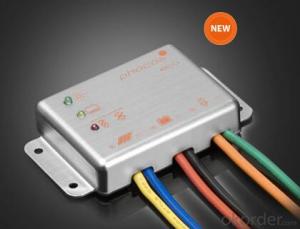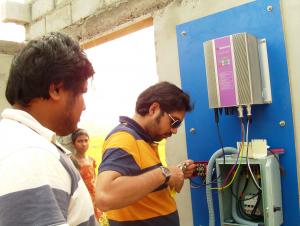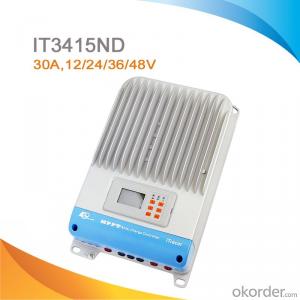PWM Solar Charge Controller,20A 12/24V,LS2024B
OKorder Service Pledge
OKorder Financial Service
You Might Also Like
Descriptions:
A charge controller, or charge regulator is basically a voltage and/or current regulator to keep batteries from overcharging. It regulates the voltage and current coming from the solar panels going to the battery. Most "12 volt" panels put out about 16 to 20 volts, so if there is no regulation the batteries will be damaged from overcharging. Most batteries need around 14 to 14.5 volts to get fully charged.
Features:
·High efficiency PWM charging with temperature compensation
·3 LEDs shows PV charging, battery and load status
·External temperature sensor interface
·RS-485 bus communication
·Open standard Modbus communication protocol
·Software update function
·Diversified load control modes : Manual, Light ON/OFF, Light ON+ Timer, Time Control
·Battery type selection: Gel, sealed, flooded and User type
·Real-time monitor
·Programmable parameters
·LVD or SOC load disconnect function
·Energy statistics function
Electronic Protections:
·PV short circuit
·PV reverse polarity
·Battery overcharge
·Battery over discharge
·Battery reverse polarity
·Load short circuit
·Load overload
·Overheating
Specification:
Electrical parameters | LS1024B | LS2024B | LS3024B |
Nominal System Voltage | 12 / 24V auto work | ||
Rated Battery Current | 10A | 20A | 30A |
Maximum battery voltage | 50V | ||
Grounding | Common positive | ||
Self-consumption | 8.4mA(12V),7.8mA(24V) | ||
Temp. compensation | -3mV/℃/2V(25℃ ref) | ||
Equalize charging voltage | Sealed: 14.6V, Flooded: 14.8V, User-defined: 9~17V | ||
Boost charging voltage | Gel: 14.2V, Sealed: 14.4V, Flooded: 14.6V, User-defined: 9~17V | ||
Float charging voltage | Gel /Sealed /Flooded: 13.8V, User-defined: 9~17V | ||
Low voltage reconnect voltage | Gel /Sealed /Flooded: 12.6V, User-defined: 9~17V | ||
Low voltage disconnect voltage | Gel /Sealed /Flooded: 11.1V, User-defined: 9~17V | ||
Working temp. | -35℃~+55℃ | ||
Humidity | ≤95% (NC) | ||
Enclosure | IP30 | ||
Dimension | 138.6x69.3x37mm | 159.6x81.4x47.8mm | 200.6x101.3x57mm |
Terminal | 4mm2 | 10mm2 | 10mm2 |
Net weight | 0.13kg | 0.3kg | 0.5kg |
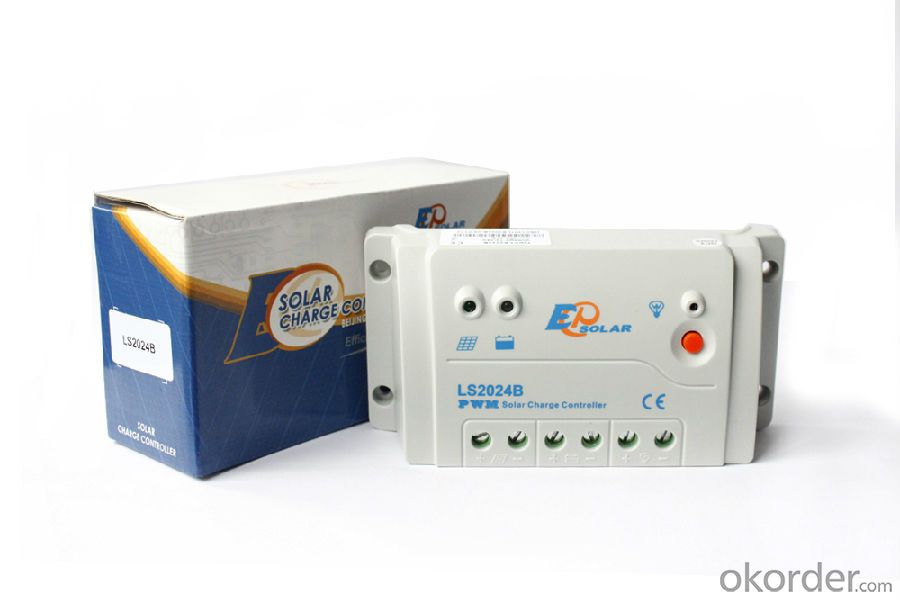
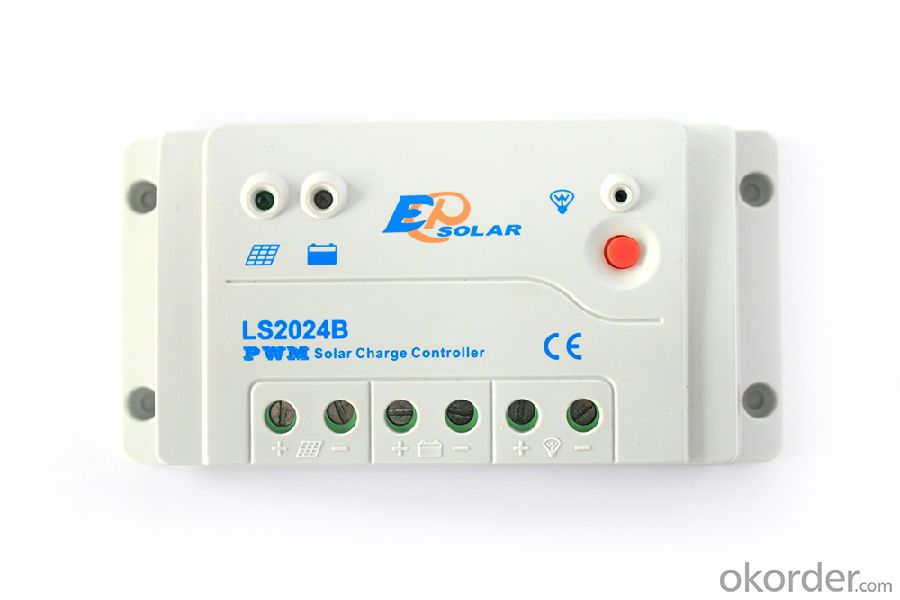
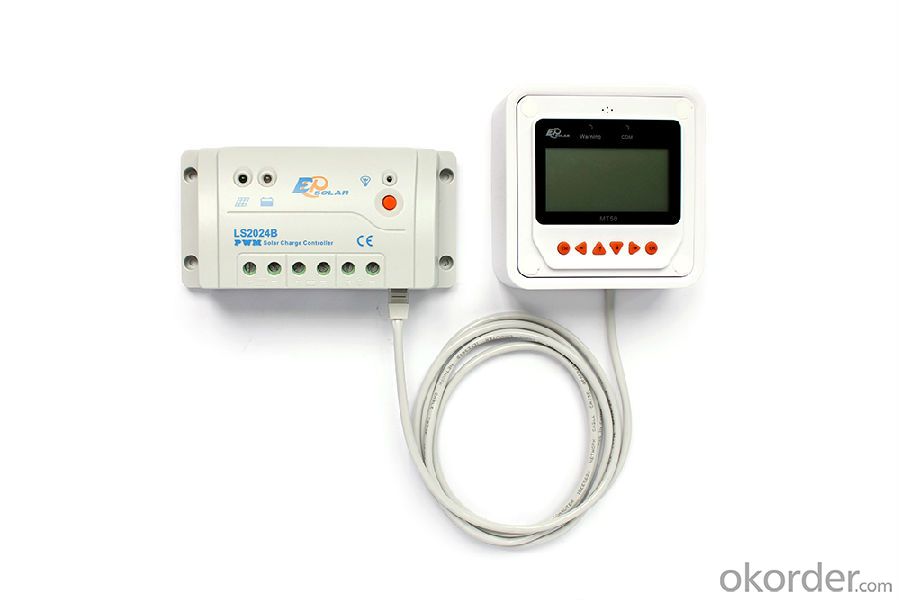
- Q: How many solar panels can be connected to a single solar controller?
- The number of solar panels that can be connected to a single solar controller depends on the specifications and capacity of the controller. It is recommended to consult the manufacturer's guidelines or specifications to determine the maximum number of panels that can be connected.
- Q: Can a solar controller be used in a solar-powered lighting system?
- Yes, a solar controller can be used in a solar-powered lighting system. A solar controller regulates the flow of electricity between the solar panels and the battery, ensuring proper charging and preventing overcharging or discharging. In a solar-powered lighting system, the solar controller helps maximize the efficiency and performance of the system by managing the energy generated by the solar panels and ensuring it is stored and used effectively.
- Q: What is the maximum number of user profiles supported by a solar controller?
- The maximum number of user profiles supported by a solar controller can vary depending on the specific model and brand. However, in general, solar controllers typically support multiple user profiles, ranging from as few as 2 to as many as 10 or more.
- Q: How does a solar controller handle variations in solar panel current?
- A solar controller handles variations in solar panel current by regulating and optimizing the charge flow between the solar panels and the battery. It continuously monitors the current output from the panels and adjusts the charging parameters to match the battery's requirements. This ensures that the battery receives the appropriate amount of charge and prevents overcharging or undercharging, thereby maximizing the efficiency and lifespan of the battery.
- Q: Can a solar controller be used in a solar-powered electric bus charging system?
- Yes, a solar controller can be used in a solar-powered electric bus charging system. A solar controller helps regulate the flow of electricity from the solar panels to the batteries, ensuring efficient charging and preventing overcharging or damage to the batteries. It is an essential component in managing the charging process in a solar-powered electric bus charging system.
- Q: Can a solar controller be used with different types of solar tracking systems?
- Different types of solar tracking systems can be used with a solar controller. The solar controller has the responsibility of managing battery charge and discharge in a solar power system, as well as regulating power flow between the solar panels and batteries. Its main purpose is to ensure that the solar panels operate at their highest efficiency and that the batteries are charged correctly. Solar tracking systems have been designed to align solar panels with the sun, maximizing energy generation. There are various types of solar tracking systems available, including single-axis and dual-axis trackers, which differ in their ability to track the sun's movement. As long as the solar controller is compatible with the specifications and requirements of the tracking system, it can be integrated with any type of solar tracking system. The controller must be able to communicate with and receive input from the tracking system to adjust the orientation of the solar panels accordingly. Additionally, the solar controller should have the capability to handle increased power output and fluctuations caused by the movement of the solar panels. Using a solar controller in conjunction with a tracking system can improve the overall efficiency and performance of the solar power system. The controller ensures proper charging of the batteries by preventing overcharging or undercharging, while also optimizing the power flow between the solar panels and batteries.
- Q: What is the maximum discharge current for a solar controller?
- The maximum discharge current for a solar controller typically depends on the specific model and its specifications. It can range from a few amps to several hundred amps, based on the intended use and capacity of the controller.
- Q: How do solar controllers help in maximizing energy harvest?
- Solar controllers play a crucial role in maximizing energy harvest from solar panels by efficiently managing and regulating the flow of electrical energy. These devices are designed to monitor and control the charging process of batteries connected to solar panels. One key function of solar controllers is to prevent overcharging of batteries, which can lead to reduced battery capacity and lifespan. By constantly monitoring the battery voltage and current, solar controllers ensure that the batteries are charged optimally, preventing any damage due to overcharging. This feature is particularly beneficial in areas with high solar radiation, where the risk of overcharging is higher. Solar controllers also help in maximizing energy harvest by implementing a technique called maximum power point tracking (MPPT). MPPT technology allows the solar controller to continuously adjust the voltage and current from the solar panels to the optimal levels that produce the maximum power output. By dynamically tracking the maximum power point, solar controllers ensure that the solar panels operate at their most efficient state, even under varying weather conditions or changes in solar intensity. Furthermore, solar controllers often have additional features such as load control and time-based control. Load control allows the solar controller to regulate the power supplied to loads connected to the system, preventing overconsumption or overdischarge of the batteries. Time-based control enables users to program specific time intervals for the solar panels to charge the batteries, ensuring that energy harvest is maximized during periods of peak sunlight. In summary, solar controllers maximize energy harvest by preventing overcharging of batteries, implementing MPPT technology to optimize the power output of solar panels, and providing additional features for load and time-based control. These devices play a crucial role in ensuring the efficient and effective utilization of solar energy, ultimately leading to increased energy harvest and improved system performance.
- Q: Can a solar controller be used with a solar-powered pool heater?
- Yes, a solar controller can be used with a solar-powered pool heater. A solar controller helps regulate and optimize the flow of energy from the solar panels to the pool heater, ensuring efficient heating and temperature control. It allows for better monitoring and adjustment of the solar system, maximizing the effectiveness of the pool heater and overall energy savings.
- Q: How does a solar controller handle lightning protection?
- To ensure the safety of a solar controller and its connected devices, it is crucial to incorporate lightning protection mechanisms. These measures are vital because lightning strikes can introduce a massive surge of electrical energy into the system, potentially causing irreparable damage. In order to address the issue of lightning protection, a solar controller utilizes diverse strategies. One commonly employed technique involves the utilization of surge protection devices (SPDs) or lightning arrestors. These devices are specifically designed to redirect the surge of electrical energy away from the sensitive components of the solar controller. By utilizing metal oxide varistors (MOVs) or gas discharge tubes (GDTs), SPDs effectively absorb and redirect excess voltage to the ground, preventing any harm from reaching the controller. Furthermore, the solar controller may incorporate shielding and grounding techniques to provide an extra layer of protection against lightning. Shielding involves enclosing the sensitive components in a conductive material, typically metal, to create a Faraday cage effect. This shielding assists in blocking or minimizing the impact of electromagnetic interference caused by lightning strikes. On the other hand, grounding involves connecting the metal components of the solar controller to a grounding system. This ensures a safe pathway for lightning energy to dissipate harmlessly into the ground rather than passing through the controller. It is important to acknowledge that although a solar controller's built-in lightning protection measures significantly reduce the risk of damage, they do not offer complete immunity against lightning strikes. In areas prone to frequent lightning activity, it may be necessary to employ additional external lightning protection systems, such as lightning rods or lightning arrestor systems, to further enhance the overall safety of the solar power system.
Send your message to us
PWM Solar Charge Controller,20A 12/24V,LS2024B
OKorder Service Pledge
OKorder Financial Service
Similar products
Hot products
Hot Searches
Related keywords
